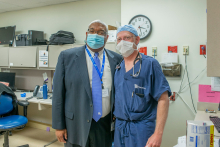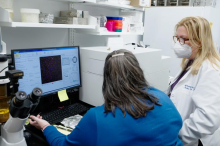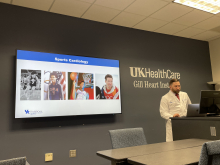What Is Monkeypox? A UK Virologist Explains
Cancer Survivors Bond Over Shared Experiences at Markey's Expressions of Courage Event
Dementia Friendly Lexington
UK Study: Asymptomatic COVID-19 Could Still Cause Pregnancy Risks
‘It’s Never Too Late’ — Barnstable Brown Helps Patient Regain Control of Her Health
UK's START Program Offers High Schoolers STEM Education, Experience
New Internal Medicine Chair Dr. Conwell Has Heart for his Patients, his Trainees, and Appalachia
Darwin Conwell, MD, MSc, FACG, (pictured left) recently joined the University of Kentucky College of Medicine as a professor and the Jack M. Gill Endowed Chair in Internal Medicine.
A southern Ohio native with deep roots in western Kentucky tobacco, Dr. Conwell has enjoyed a full career in academic medicine with roles at the Cleveland Clinic, Harvard Medical School, and The Ohio State University. He arrives to UK with a passion for mentorship and patient-centered health care, as well as an appreciation for Appalachia.
Pediatric Cancer Research Funding Critical to Save Lives
Innovative research in pediatric cancers is happening every day at the University of Kentucky.
In the United States, 80% of children are cured of their cancer, but 20% are not.
Honored CV Fellow Grand Rounds
5/20/2022 - Dr. Marc Paranzino (3rd year Cardiology Fellow) presented at Internal Medicine Grand Round. He talked about his passion in Sports Cardiology. Dr. Paranzino gave us an overview of what Sports Cardiology involves, relevant diseases that athletes may be screened for, and the data behind it. This is one of the exciting fields that has been brought to the forefront during COVID, as there has been many concerns about athletes returning to sports participation due to myocarditis. It was a fantastic talk. Due to COVID precautions, many attended the talk via Zoom.



